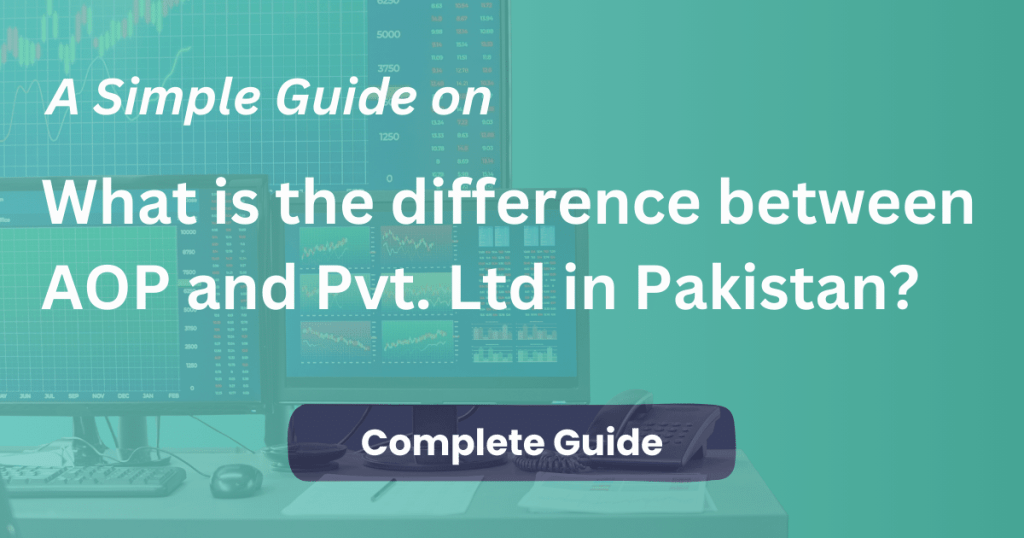
When it comes to setting up a business in Pakistan, there are
various legal structures to consider. Among the most common are
the Association of Persons (AOP) and Private Limited (Pvt. Ltd)
companies. Each has its own set of characteristics, advantages,
and disadvantages. Let’s dive into the details to understand the
disparities between the two.
If you need instant assistance, please consult our tax and accounting professional here or learn more about our services.
Association of Persons (AOP):
An AOP is a business structure where two or more persons come
together to carry out a business with the aim of making a profit.
This could include partnerships, joint ventures, or any other
association of individuals for a common purpose. In Pakistan,
AOPs are regulated under the Income Tax Ordinance, 2001.
Key Features of AOP:
Taxation: AOPs are taxed as a separate entity, but the profits
are distributed among the members who are then taxed
individually based on their share.
Legal Liability: Members of an AOP have unlimited liability,
meaning their personal assets may be at risk to cover
business debts or liabilities.
Formation: AOPs are relatively easy to form, usually
requiring a partnership deed outlining the terms and
conditions of the partnership.
Management: The management of an AOP can be shared
among its members, with each member having a say in
decision-making
Private Limited (Pvt Ltd) Company:
On the other hand, a Private Limited company is a separate legal
entity from its shareholders, governed by the Companies Act,
2017 in Pakistan. It’s a popular choice for small to medium-sized
businesses due to its advantages in terms of liability protection
and ease of ownership transfer.
Liability of Shareholders: The liability is limited to the
contributed amount.
Minimum Capital Required: PKR 100,000 is the minimum
capital required.
Number of partners: Maximum 50 partners and minimum 2
partners are allowed.
Key Features of Pvt. Ltd Company:
Limited Liability: One of the most significant advantages of a
Pvt. Ltd company is limited liability. Shareholders’ liability is
limited to the extent of their shareholding in the company.
Taxation: Pvt. Ltd companies are taxed separately from their
owners, and dividends distributed to shareholders are
subject to withholding tax.
Formation: Setting up a Pvt. Ltd company involves more
formalities compared to an AOP. It requires registration
with the Securities and Exchange Commission of Pakistan
(SECP) and adherence to various regulatory requirements.
Ownership Transfer: Shares of a Pvt. Ltd company can be
easily transferred, allowing for flexibility in ownership.
Differences in Company Law and Tax Laws:
Company Law: AOPs are governed by the provisions of the
Income Tax Ordinance, 2001, while Pvt. Ltd companies fall
under the Companies Act, 2017.
Taxation: AOPs are taxed differently as compared to Pvt.
Ltd companies. In AOPs, taxation is based on the individual
income of the members, whereas Pvt. Ltd companies are
taxed separately.
Which One to Choose between Aop and a Pvt company?
The choice between an AOP and a Pvt. Ltd company depends
on various factors such as the nature of the business, the number
of owners, risk appetite, and long-term objectives. If you’re
looking for limited liability and easier access to funding, a Pvt. Ltd
company might be the way to go. However, if you prefer
simplicity in management and taxation, an AOP could be a
suitable option.
In conclusion, both AOPs and Pvt. Ltd companies offer distinct
advantages and cater to different business needs. Understanding
the differences between the two structures is crucial for making an
informed decision when starting a business in Pakistan. It’s
advisable to consult legal and financial professionals to determine
the most suitable option for your specific circumstances. If you need more information, please reach out to us or check this detailed post on the same topic.
